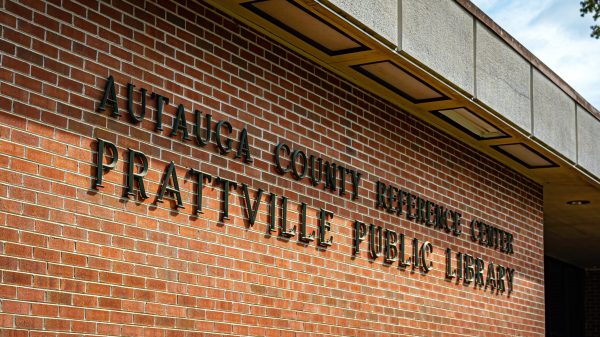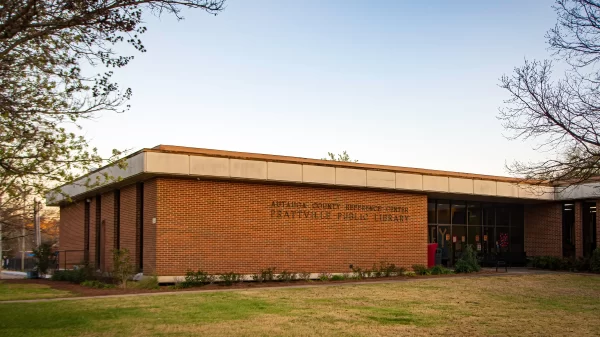|
Getting your Trinity Audio player ready...
|
Andrew Foster, the Autauga-Prattville Public Library Director terminated last week, has released a letter from his attorney Christopher Weller to the board demanding his reinstatement, and letters to APPL Board Chair Ray Boles and APPL Board attorney Laura Clark demanding public retractions.
Demand for reinstatement, library access and name-clearing hearing
The letter to the board of trustees calls for his library access to be restored and a name-clearing hearing to be held in addition to his job position being restored.
The letter lists potential legal violations the board committed during the course of Foster’s termination.
To begin, Weller alleges the board never stated the purpose for executive session in its motion to enter the executive session.
“… the board failed to set forth, by motion, the purpose of the executive session,” the letter claims.
Under the Open Meetings Act, a “majority of members of the governmental body must adopt, by recorded vote, a motion calling for the executive session and setting forth the purpose of the executive session.”
The board also violated the Open Meetings Act by deliberating outside of an open meting, Foster’s letter claims.
“When Mr. Foster entered into the executive session, the board immediately informed him that the decision had been made to terminate his employment unless he immediately tendered his resignation,” the letter states.
This is consistent with Foster’s account of the executive session, and conflicts with Boles’ statements that the decision to terminate Foster came after they learned he was recording the executive session.
As further evidence, the letter claims the board presented Foster with a “crudely crafted, preprinted letter of resignation.”
The third OMA violation alleged in the letter argues that even if the board had entered the executive session lawfully, the board still violated law by improperly discussing Foster’s job performance under the guise of “good name and character.”
The fourth listed OMA violation is not related to Foster’s termination meeting, but the meeting on Saturday, Mach 16 to hire interim director Tammy Bear. The letter alleges proper notice was not given of the meeting as no more than 23 hours notice was given, violating the required 24-hour notice for a special called meeting.
Weller also rebuffs Clark’s former assertion that the meeting was actually an emergency meeting, noting that at no point was the meeting ever referred to as an emergency meeting until after APR reported that the meeting had violated the OMA.
“In other words, Mrs. Clark appears to have concocted a post-hoc emergency to rationalize the board’s clear violation of the OMA’s twenty-four hour minimum notice requirement,” the letter states.
The letter states that the board violated Foster’s due process in part by publishing “false and stigmatizing statements about the termination of Mr. Foster’s employment.”
“… the Eleventh Circuit has held ‘that when an employer publishes a false and stigmatizing statement about an employee in connection with [his] discharge, due process requires a meaningful opportunity to clear one’s name—through what is called a ‘name-clearing hearing,’ upon request—whether before or after the termination or publication,'” the letter states.
Further, Weller claims in the letter that Boles and/or the board violated his due process by banning him from the library.
“Shortly after the board’s meeting (to fire Foster) concluded, Mr. Foster returned to the library to bid goodbye to his colleagues,” Weller said. “At all times during his visit, Mr. Foster remained in the patron areas of the library. Mr. Foster was not disruptive, nor did he instruct anyone on the premises to be disruptive. Soon after Mr. Foster arrived at the library, Chairman Boles arrived as well. Then, without any explanation whatsoever, Chairman Boles demanded that Mr. Foster immediately vacate the library premises and he announced that he was permanently ‘banned’ from the library. Many witnesses and members of the news media witnessed this interaction.”
While the library director can ban people from the library under policy, it is not without due process protections.
“… the initial decision-making authority with respect to the decision to ban a person from the library is delegated to the library director, not the board (or its individual members),” Weller states in the letter. “This alone should end the inquiry.”
In addition, the banned patron is supposed to have an opportunity to appeal the ban before the board, requiring collective action of the board for a ban.
The ban also brings concerns of First Amendment violations, Weller said.
Demand for retraction, correction and apology from Boles
The first charge of defamatory statement against Boles is that Boles’ statement that Foster “violated criminal law” is “patently false and defamatory.”
Weller cites APR’s report including Clark’s refusal to provide what criminal law Foster violated.
As for whether Foster’s recording broke criminal eavesdropping law, he states that “Alabama … is a “one party” consent state for purposes of criminal eavesdropping” and “Foster clearly consented to the brief recording.”
Even if Foster’s recording violated the Open Meetings Act, as Boles and Clark claimed, penalties for violating that act are civil, not criminal. And Weller states the board must have reasonable rules for the implementation of such a prohibition on recording, but no such rules exist.
The second charge of defamation against Boles relates to claims that Foster released confidential information.
Weller contends that the email is subject to the Alabama Open Records Act and that an Attorney General opinion shared with Foster by City of Prattville attorney Andrew Odom is inapplicable to communications between the board members.
“The Attorney General Opinion (AGO 2017-036) Mr. Odom cites is specifically limited to internal emails ‘on possible actions to be taken by [an] agency,'” Weller states. “In this case, however, the Foster/Clark email communication does not concern ‘possible actions’ to be taken by the board, but rather whether the subject books on the list can be removed without a vote of the board.”
While Boles has contended the emails released were confidential, Wellers said Boles also offered to share emails with the press.
“… in what can only be described as a case of delicious irony, you offered to share the Odom email (the type of email you now contend is protected from disclosure by the attorney-client privilege) with reporter Kyle Whitmire of AL.com.
The letter goes on to note that Clark’s email included no designation that the email should be considered confidential, and that Clark had not advised Foster not to release emails despite him responding to open records requests on numerous occasions.
Weller also notes that if Clark is asserting a violation of attorney-client privilege, that the privilege does not exist to protect the attorney, but the client, and that the privilege is not even Clark’s assert, but the board’s. Weller also notes a comment from Clark on an APR Facebook post discussing the content of the email.
The third and final charge of defamation against Boles relates to statement he made to Marty Roney with the Montgomery Advertiser and Joey Clark on WACV 93.1 FM, stating that Foster had defied his instruction to keep the books on the shelf, despite telling Foster in an email and in a recorded in-person meeting to keep the books in his office until the board could make a further decision.
Demand for retraction, correction and apology from Clark
The two charges of defamatory statements against Laura Clark mirror two of the charges against Boles: that Clark defamed Foster by falsely stating he had violated criminal law, and by falsely stating he had released confidential information.
“The obvious purpose of your statements (to media) was to shore up the board’s decision to terminate Mr. Foster’s employment and to disparage and damage the reputation of Mr. Foster in the eyes of city and county officials as well as the community at large,” Weller tells Clark in the letter.
Weller further states that the first and only directive from Clark regarding the confidentiality of attorney-client emails “came only after the Alabama Political Reporter published an article that placed both you and the board in a poor light.”
Much of the rest of the letter to Clark uses the same language as the Boles letter.
This is a developing story. Board members, or board attorney Laura Clark, are encouraged to reach out to Jacob Holmes at jholmes@alreporter.com to respond to these claims.






















































